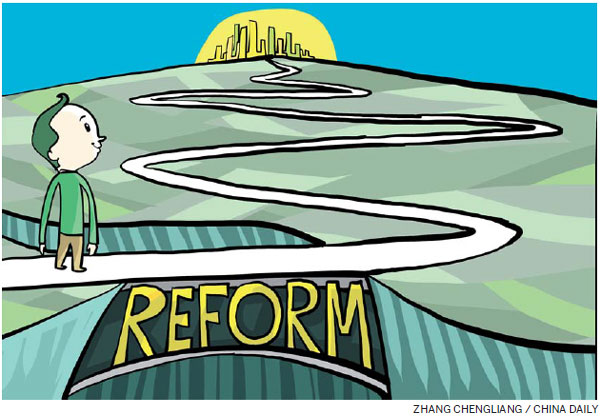Reform is only way forward for economy
Updated: 2015-09-05 07:43
By Ed Zhang(China Daily Europe)
|
|||||||||||

Long-term, structural goals can lead to a meaningful future, but there is no plan B
Observers of the Chinese economy follow two different lines. One is focused on the short-term targets, if not instant gains. If this line is adopted, then one is almost certain to have been alarmed by the country's recent stock market rout and a continuing slowdown in GDP growth, and along with that, a slowdown in many major business indexes.
The other line pays more attention to the economy's long-term and structural issues - most importantly how much freedom citizens can have to launch and operate their businesses, and how much competitive Chinese entrepreneurs can become in the global market.
A common mistake is to confuse the two lines and mix the two different sets of goals and tasks. So, at this moment, it is easy to come up with a negative picture of China - when it cannot, because it really should not, repeat its past growth record, and still needs a lot of time and effort to achieve its long-term and structural goals.
Whether or not China can generate its promised 7 percent annual growth in GDP is not important. Only things with a long-term significance can lead to a meaningful future.
So the economy's growth is bound to be low until some new and less-wasteful industries can become the mainstay, which at the moment doesn't seem to be happening anywhere in the world. Industrial revolutions always come in waves. And we are between waves.
With fundamentals of the real economy remaining weak, the stock market is bound to be a place where investors must show caution and not be fooled by an occasional and short-lived bull run.

A long-term change would by nature call for change-makers' repeated experimentation and for onlookers' patience.
Some observers point out that it was actually a long time ago when China admitted to the world that its export-dependent and land development-driven growth model is unsustainable. If that is taken as the starting point of its transition, then it seems a transition to nowhere, because for all these years hardly any progress has been made.
But saying one thing is different from really doing it. China did not come up with its next-stage reform program until late 2013, when many of its government offices were hardly prepared for any of the would-be changes that the leaders promised.
Drawing up a program for change is not change itself, either. The plan for a second-stage reform of state-owned enterprises, preferably to follow the model of public-private partnership, has yet to be put into serious practice, much less on a national scale.
One example sufficiently reflects the stern reality that Chinese leaders face. Indeed, China is a long way from the end scenario of the expected transition.
People have only limited patience, of course. And investors usually have even less. But if China doesn't keep experimenting with various reform designs, what else can it do to grow into a responsible, large economy? This country's only way forward is to reform, and there is no plan B.
Viewing China from this perspective, people will come to understand more clearly the positive role of the anti-corruption campaign led by President Xi Jinping. Perhaps nothing more efficient can be done to shatter the bureaucratic resistance to the reform.
The author is editor-at-large of China Daily. Contact the writer at edzhang@chinadaily.com.cn
Today's Top News
Austria to end messures letting migrants in
Ex-VP nominee Palin: Immigrants in US should 'speak American'
China 2014 GDP growth revised down to 7.3%
White paper on Tibet reaffirms living Buddha policy
Austria, Germany open borders to migrants
PBOC governor says stock market correction roughly in place
'We must learn from the past':UN chief
Social media take parade to the world
Hot Topics
Lunar probe , China growth forecasts, Emission rules get tougher, China seen through 'colored lens', International board,
Editor's Picks

|

|

|

|

|

|






